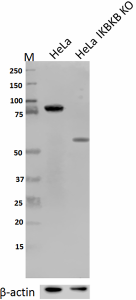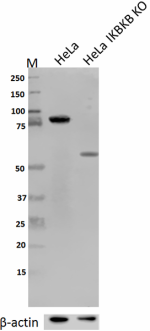- Clone
- W15160A (See other available formats)
- Regulatory Status
- RUO
- Other Names
- Inhibitor of nuclear factor kappa-B kinase subunit beta, IKK“Ä’, IKKbeta, NFKBIKB, IKKB, IKK2
- Isotype
- Mouse IgG1, κ
- Ave. Rating
- Submit a Review
- Product Citations
- publications

-

Total lysates (10 µg protein) from HeLa and HeLa IKBKB CRISPR/Cas9 knockout (KO) cells were resolved by electrophoresis (4-20% Tris-glycine gel), transferred to nitrocellulose, and probed with 1:500 (1 µg/ml) purified anti-IKBKB (IKKβ) antibody, clone W15160A (upper). Proteins were visualized using chemiluminescence detection by incubation with HRP goat anti-mouse-IgG secondary antibody (cat#405306). Direct-Blot™ HRP anti-β-actin Antibody (Cat#643807) was used as a loading control (lower). Lane M is the Molecular weight ladder. The band observed above 50 Kd in the HeLa IKBKB KO cells is IKBKB as CRISPR/Cas9 technology can cause exon skipping, which in turn results in expression of partial protein.
| Cat # | Size | Price | Quantity Check Availability | Save | ||
|---|---|---|---|---|---|---|
| 688402 | 100 µg | 216€ | ||||
NF-kappa-B (NF-κB) signaling pathway is involved in many biological responses such as immune response, growth control, DNA damage and other cellular stresses. This pathway is regulated by the inhibitory IKK proteins (composed by IKKα, IKBKB/IKKβ and IKKγ) which complex with NF-κB/Rel transcription factors in the cytosol. As part of the IKK complex, IKBKB phosphorylates inhibitors of NF-κB on 2 serine residues. These phosphorylations cause polyubiquitination and subsequent degradation of the NF-κB inhibitors. In turn, free NK-κB translocates into nucleus and activates the downstream gene transcription. Upon cytokine stimulation, phosphorylation of Ser-177 and -181 enhances IKBKB activity; on the other hand, acetylation of Thr-180 residue prevents IKKβ phosphorylation and activation, thus blocking the inhibition of NF-κB pathway.
Product DetailsProduct Details
- Verified Reactivity
- Human, Mouse
- Antibody Type
- Monoclonal
- Host Species
- Mouse
- Immunogen
- Partial human IKBKB recombinant protein (520-745 a.a.) expressed in E. coli.
- Formulation
- Phosphate-buffered solution, pH 7.2, containing 0.09% sodium azide.
- Preparation
- The antibody was purified by affinity chromatography.
- Concentration
- 0.5 mg/ml
- Storage & Handling
- The antibody solution should be stored undiluted between 2°C and 8°C.
- Application
-
WB - Quality tested
KO/KD-WB - Verified - Recommended Usage
-
Each lot of this antibody is quality control tested by Western blotting. For Western blotting, the suggested use of this reagent is 0.5 - 2.0 µg per ml. It is recommended that the reagent be titrated for optimal performance for each application.
- RRID
-
AB_2617026 (BioLegend Cat. No. 688402)
Antigen Details
- Structure
- 756 amino acids with a predicted molecular weight of 86.6 kD. Contains a N-terminal kinase domain and a leucine zipper region responsible for dimerization.
- Distribution
-
Nucleus and cytoplasm.
- Function
- IKBKB is a serine kinase that participates in the NF-κB signaling pathway. It is activated by a variety of stimuli, including inflammatory cytokines, pathogen infections, and other cellular stresses.
- Interaction
- Component of the IKK core complex. Interacts with NALP2, TICAM1, FAF1, ATM, NIBP, ARRB1, ARRB2, TRIM21, NLRC5, PDPK1, EIF2AK2/PKR, ZNF268, IKBKE, NAA10, and FOXO3.
- Biology Area
- Cell Biology, Signal Transduction
- Molecular Family
- Protein Kinases/Phosphatase
- Antigen References
-
1. Sasaki Y, et al. 2016. Curr. Top. Microbiol. Immunol. 393:177.
2. Nielsen C, et al. 2014. J. Clin. Immunol. 34:916.
3. Amaya M, et al. 2014. Pathog. Dis. 72:32.
4. Hinz M, et al. 2014. EMBO Rep. 15:46.
5. Mousallem T, et al. 2014. Blood. 124:2046.
6. Schmid JA, et al. 2008. Cytokine Growth Factor Rev. 19:157. - Gene ID
- 3551 View all products for this Gene ID
- UniProt
- View information about IKBKB on UniProt.org
Related Pages & Pathways
Pages
Related FAQs
Other Formats
View All IKBKB (IKKβ) Reagents Request Custom Conjugation| Description | Clone | Applications |
|---|---|---|
| Purified anti-IKBKB (IKKβ) | W15160A | WB,KO/KD-WB |
Compare Data Across All Formats
This data display is provided for general comparisons between formats.
Your actual data may vary due to variations in samples, target cells, instruments and their settings, staining conditions, and other factors.
If you need assistance with selecting the best format contact our expert technical support team.
-
Purified anti-IKBKB (IKKβ)

Total lysates (10 µg protein) from HeLa and HeLa IKBKB CRISP...
 Login / Register
Login / Register 







Follow Us